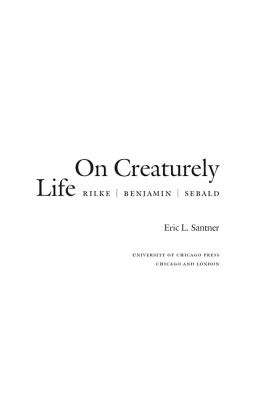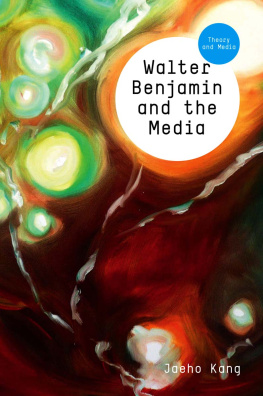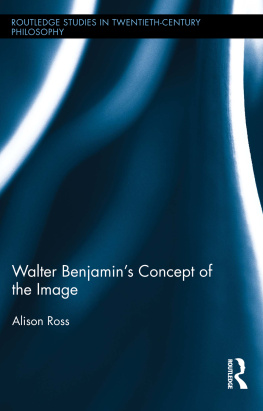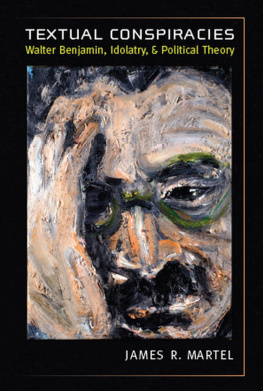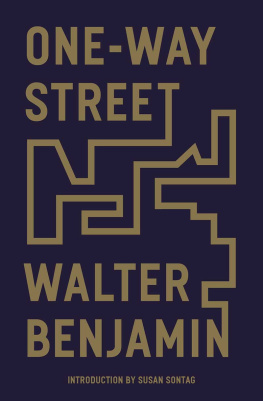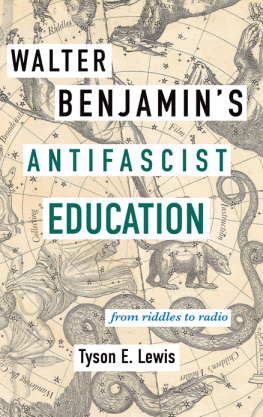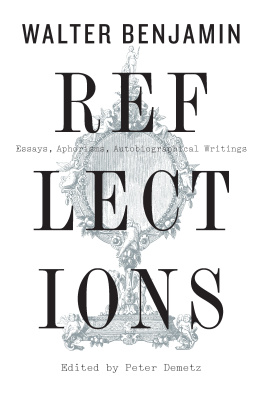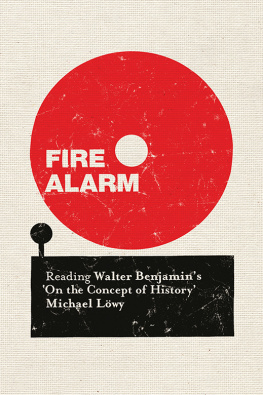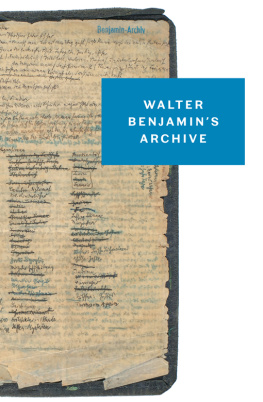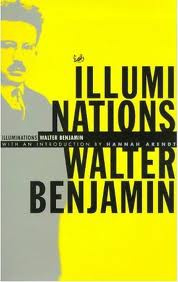Benjamin Walter - Benjamins passages: dreaming, awakening
Here you can read online Benjamin Walter - Benjamins passages: dreaming, awakening full text of the book (entire story) in english for free. Download pdf and epub, get meaning, cover and reviews about this ebook. City: New York, year: 2015;2014, publisher: Fordham University Press, genre: Science. Description of the work, (preface) as well as reviews are available. Best literature library LitArk.com created for fans of good reading and offers a wide selection of genres:
Romance novel
Science fiction
Adventure
Detective
Science
History
Home and family
Prose
Art
Politics
Computer
Non-fiction
Religion
Business
Children
Humor
Choose a favorite category and find really read worthwhile books. Enjoy immersion in the world of imagination, feel the emotions of the characters or learn something new for yourself, make an fascinating discovery.

- Book:Benjamins passages: dreaming, awakening
- Author:
- Publisher:Fordham University Press
- Genre:
- Year:2015;2014
- City:New York
- Rating:5 / 5
- Favourites:Add to favourites
- Your mark:
- 100
- 1
- 2
- 3
- 4
- 5
Benjamins passages: dreaming, awakening: summary, description and annotation
We offer to read an annotation, description, summary or preface (depends on what the author of the book "Benjamins passages: dreaming, awakening" wrote himself). If you haven't found the necessary information about the book — write in the comments, we will try to find it.
Benjamins passages: dreaming, awakening — read online for free the complete book (whole text) full work
Below is the text of the book, divided by pages. System saving the place of the last page read, allows you to conveniently read the book "Benjamins passages: dreaming, awakening" online for free, without having to search again every time where you left off. Put a bookmark, and you can go to the page where you finished reading at any time.
Font size:
Interval:
Bookmark:
Benjamins Passages
Benjamins Passages
Dreaming, Awakening
Alexander Gelley
FORDHAM UNIVERSITY PRESS
NEW YORK 2015
Copyright 2015 Fordham University Press
All rights reserved. No part of this publication may be reproduced, stored in a retrieval system, or transmitted in any form or by any meanselectronic, mechanical, photocopy, recording, or any otherexcept for brief quotations in printed reviews, without the prior permission of the publisher.
Fordham University Press has no responsibility for the persistence or accuracy of URLs for external or third-party Internet websites referred to in this publication and does not guarantee that any content on such websites is, or will remain, accurate or appropriate.
Fordham University Press also publishes its books in a variety of electronic formats. Some content that appears in print may not be available in electronic books.
Visit us online at www.fordhampress.com.
Library of Congress Cataloging-in-Publication Data
Gelley, Alexander.
Benjamins passages : dreaming, awakening / Alexander Gelley. First edition.
pages cm
Includes bibliographical references and index.
ISBN 978-0-8232-6256-4 (cloth : alk. paper) ISBN 978-0-8232-6257-1 (pbk. : alk. paper)
1. Benjamin, Walter, 18921940Criticism and interpretation. I. Title.
PT2603.E455Z6732 2015
838'.91209dc23
2014029447
Printed in the United States of America
17 16 15 5 4 3 2 1
First edition
For Mieke, first of all, and Ora, Mira, Andrew, Reuben, and Levi
CONTENTS
| GB | Gesammelte Briefe, 6 vols., ed. Christoph Gdde and Henri Lonitz (Frankfurt am Main: Suhrkamp Verlag, 19952000). |
| GS | Gesammelte Schriften, 7 vols., ed. Rolf Tiedemann and Hermann Schweppenhuser (Frankfurt am Main: Suhrkamp Verlag, 197489). |
| SW | Selected Writings, 4 vols., ed. Michael W. Jennings, et al. (Cambridge: Harvard University Press, 19962003). |
| TAP | The Arcades Project, trans. Howard Eiland and Kevin McLaughlin (Cambridge: Harvard University Press, 1999). |
Benjamins Passages: Dreaming, Awakening is focused on Benjamins work of the 1930s, though it reaches back to earlier writings, too (for example, The Task of the Translator, the study of Goethes novel The Elective Affinities), in order to establish certain continuities. The introduction and the seven chapters are intended to deal with central issues of Benjamins later work: the interplay of aesthetics and politics in his criticism ().
Many (but not all) of Benjamins principal writings of the later period are discussed in these chapters: the essay on Goethes The Elective Affinities and The Work of Art in the Age of Its Technological Reproducibility (). But my intention is not to cover a period of Benjamins writings but rather to trace a limited number of issues.
The has a number of aims: to situate Benjamins place in the current field of theory, to lay out elements of the biographical context of some of the writings, and to give a preview of some of the arguments of the subsequent chapters. A section on The Storyteller highlights one aspect of Benjamins major accomplishment as a literary theorist, a topic that this book has not tried to address.
The title alludes to the Passagen (arcades) of the project, of course, but it also refers to Benjamins effort to negotiate the labyrinth of his work and thought in this period. And it is intended to foreground the figurative status of awakening within the allegorical structure of The Arcades Project.
In transposing the Freudian dream work from the individual subject to the collective, Benjamin projected a macrocosmic journey of the individual sleeper to the dreaming collective, which, through the arcades, communes with its own insides. He credited the Surrealists with being the first to offer a means of deciphering the nineteenth centurys narcotic historicism, its passion for masks. He was well aware of Marxs early remark that reform of consciousness will come when people will see that the world has long possessed the dream of a thingand that it only needs to possess the consciousness of this thing in order really to possess it. But any such invocation of a past cannot draw on some form of conscious recollection or antiquarian recovery. Rather, the dialecticalthe Copernicanturn of remembrance [Eingedenken] functions as a solicitation, a call to a collectivity to come. This is linked to the motif of awakening, put forth in some entries of The Arcades Project and in On the Concept of History, and it conveys, I will argue, a qualified performative intent, a reaching out to a virtual collective to be constituted by awakening. The realization of dream elements in the course of waking up is the canon of dialectics. It is paradigmatic for the thinker and binding for the historian, he wrote in The Arcades Project. Benjamins effort to transpose the dream phenomenon to the history of a collective remained fragmentary, but it underlies the principle of retrograde temporality, which, I argue, is central to his idea of history.
Over almost two decades, I have received encouragement and advice from many quarters: first, from colleagues in the Critical Theory Institute (CTI) and the Comparative Literature Department at the University of California, Irvine, and especially Jane Newman. In addition, I am deeply grateful for a Guggenheim Fellowship in 199394, which was important in the first stage of my work. Finally, Ackbar Abbas, Michael Levine, and, most of all, Erin Obodiac have proved invaluable in advising me more recently.
Earlier versions of some of the chapters appeared in the following publications: Thematics and Historical Construction: The Example of Benjamins Passagen-Werk, Strumenti Critici, n.s. IV, 2 (May 1989), 2543; Contexts of the Aesthetic in Walter Benjamin, MLN 114.5 (December 1999): 93361; Epigones in the House of Language: Benjamin on Kraus, Partial Answers 5, 1 (January 2007): 1732; and Benjamin and Atget: Empty Streets and the Fading of Aura, Annals of Scholarship, forthcoming, 2014.
Irvine, California, December 2013
... the conviction guiding me in my literary endeavors... That is to say, the conviction that every truth has its home, its ancestral palace, in language; and that this palace is constructed out of the oldest logoi; and that insights of individual bodies of knowledge remain subordinate to truth grounded in this way, insofar as, somewhat like nomads, they draw here and there on the domains of language, caught up in that signifying character of language that stamps its terminology with the most irresponsible arbitrariness.
TO HUGO VON HOFMANNSTHAL, January 13, 1924 (GB 2: 409)
You know that I have always written in accordance with my convictions, but have seldom, and never otherwise than in conversation, made the attempt to express the whole contradictory fundament from which they, in their specific manifestations, derive.
TO GERSHOM SCHOLEM, May 6, 1934 (GB 4: 408)
Posthumous Fame
Walter Benjamins reputation emerged in the 1960s and 1970s, well after his death in 1940, and to a degree that was hardly conceivable in his lifetime. As his writings became known, they assumed a place alongside those of other thinkers of the centuryfor example, Freud, Wittgenstein, Heidegger, Foucaultwho may be characterized as, in Foucaults words, initiators of discursive practices, authors who produced not only their own work, but the possibility and the rules of formation of other texts. He enunciated the underlying issue in The Arcades Project
Next pageFont size:
Interval:
Bookmark:
Similar books «Benjamins passages: dreaming, awakening»
Look at similar books to Benjamins passages: dreaming, awakening. We have selected literature similar in name and meaning in the hope of providing readers with more options to find new, interesting, not yet read works.
Discussion, reviews of the book Benjamins passages: dreaming, awakening and just readers' own opinions. Leave your comments, write what you think about the work, its meaning or the main characters. Specify what exactly you liked and what you didn't like, and why you think so.

